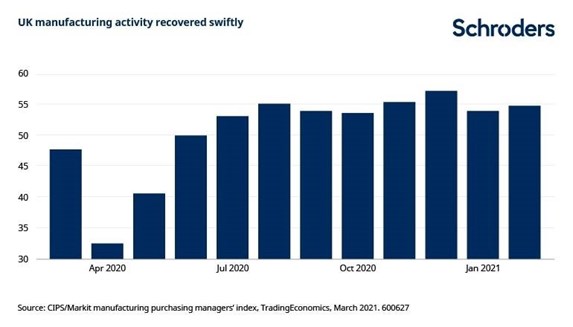How can investors access the UK's industrial recovery?

Industrial and construction businesses are seeing activity bounce back after the disruption of 2020, but there are structual factors supporting longer term growth too - by Rory Bateman, Head of Equities and manager of Schroder British Opportunities Trust
The UK has barely begun to edge out of its third Covid-19 lockdown but economic activity in some sectors is already racing ahead. While consumer-facing services businesses still await a return to ‘normal’, the industrial manufacturing and construction parts of the economy are recovering strongly.
We can see signs of this in the CIPS/Markit manufacturing purchasing managers’ index. The sharp fall from March to April 2020 marks the start of the pandemic in the UK but it’s notable how quickly activity then recovered, with the index clearly above 50 (which separates expansion from contraction) from July onwards.
The latest dip from December to January can be attributed to the current lockdown but a reading of 54.1 (for January 2021) still implies robust activity. By contrast, the equivalent reading for the services sector was below 40 in January.

Further evidence of the swift bounce-back can be found in housing starts data. Housing starts reached 35,710 units in the third quarter of 2020, a sharp jump up from the pandemic-depressed level of 15,930 in the second quarter.
It’s not just the lockdown/unlocking cycle that has helped activity rebound; other factors are at play too. Ongoing low interest rates enable borrowing for investment. Further long-term support also comes from government policy, and from the need to repair, maintain and improve the UK’s housing stock and other buildings.
The UK is home to numerous smaller companies who are well placed to benefit from these trends. We can identify several industrial manufacturers and construction businesses who have excellent products, structural growth opportunities, and strong sustainability profiles.
Government initiatives are tailwind for sector
In terms of government policy, longer-term support for industrial manufacturers and construction businesses is present in the form of ambitious house-building targets.
House-building has fallen behind the formation of new households for many years now, leaving the UK with an increasingly severe shortage of homes. The UK government is targeting construction of one million new homes - meaning 300,000 new homes a year by the mid-2020s - but housing completions are well off this pace.
The imperative to provide new homes means the pace of construction is likely to pick up, providing a tailwind for companies operating in the sector. Most obviously, there will be a requirement for bricks.
The UK stock market is home to manufacturers such as Ibstock who have a strong focus on the domestic UK market and an extensive product range, offering over 450 types of bricks. It also has a focus on sustainability, procuring 100% of its electricity from renewable sources.
Other examples include Breedon Group, a provider of aggregates, cement and other construction materials, whose operations are focused on the UK and Ireland. Again, sustainability is a focus with local suppliers and services used whenever possible.
As well as the structural growth opportunities, we would also highlight that the construction materials sector is one that is quite fragmented in the UK. Mergers & acquisitions could therefore offer another pillar to the investment case for companies in the sector.
Repair, maintain and improve
It’s not only the construction of new homes that is driving activity in the sector; renovations to existing buildings are an important aspect too.
Repeated lockdowns and consequent prolonged periods of time spent at home are motivating many people to sort out household renovations or building projects. For example, desire for more space is leading many people to build extensions where possible.
Then there are the many improvements that homeowners are looking to make given the UK’s housing stock is relatively old. Improvements to heating, particularly the installation of underfloor heating and energy-efficient systems, are high on many people’s ‘to-do’ lists after a winter spent at home in lockdown.
Ventilation is another area gaining in importance. The Covid-19 crisis has brought home how vital it is to keep rooms ventilated to prevent the spread of viruses. But even before the crisis, British people were spending 90% of their time indoors and therefore the quality of air we breathe indoors is hugely important.
The ventilation aspect is even more critical for public buildings – schools, offices, shops, theatres, etc – given the restrictions imposed due to Covid. We could be in for a long period of improvements being made to all kinds of existing buildings.
Indeed, companies operating in the sector are already benefitting from these trends. Ventilation specialist Volution Group, for example, reported organic revenue growth of 7% for the first two months of its current financial year (August and September 2020). Polypipe Group, a provider of sustainable piping for heating and drainage, said recent trading had exceeded expectations, with revenues for November 2020 8% higher than for November 2019.
Fresh equity helps unlock growth potential
Hopefully the argument above demonstrates how the UK’s industrial manufacturers and construction firms are not simply enjoying a rebound after last year’s disruption but also benefit from longer-term drivers of structural growth.
Equity investors have a crucial part to play in supporting this longer-term growth. Numerous companies in these sectors are looking to expand and need fresh equity to help fund this.
Returning to Polypipe as an example, the company recently announced the acquisition of ADEY, a provider of filters and protection products for residential boilers. This is a growing segment of the construction market as heating technologies develop and the UK progresses towards its 2050 net zero carbon target. The acquisition was funded partly by existing debt facilities but also via a share placing.
Such placings offer equity investors the chance to inject fresh capital into companies and enable them to take advantage of growth opportunities. This helps to support innovation and employment in the UK as well as offering investors the chance to share in future growth.
We see numerous smaller UK companies that potentially offer such opportunities, both in the industrial manufacturing and construction sectors, and beyond.
More information about the Schroder British Opportunities Trust here >
To buy this fund login to your EQi account
Select Schroder British Opportunities Trust Plc - GB00BN7JZR28
Any company references are for illustrative purposes only and are not a recommendation to buy and/or sell, or an opinion as to the value of that company’s shares. The article is not intended to provide, and should not be relied on, for investment advice or research.
This communication is marketing material. The views and opinions contained herein are those of the named author(s) on this page, and may not necessarily represent views expressed or reflected in other Schroders communications, strategies or funds.
This document is intended to be for information purposes only and it is not intended as promotional material in any respect. The material is not intended as an offer or solicitation for the purchase or sale of any financial instrument. The material is not intended to provide, and should not be relied on for, accounting, legal or tax advice, or investment recommendations. Information herein is believed to be reliable but Schroder Investment Management Ltd (Schroders) does not warrant its completeness or accuracy.
The data has been sourced by Schroders and should be independently verified before further publication or use. No responsibility can be accepted for error of fact or opinion. This does not exclude or restrict any duty or liability that Schroders has to its customers under the Financial Services and Markets Act 2000 (as amended from time to time) or any other regulatory system. Reliance should not be placed on the views and information in the document when taking individual investment and/or strategic decisions.
Past Performance is not a guide to future performance. The value of investments and the income from them may go down as well as up and investors may not get back the amounts originally invested. Exchange rate changes may cause the value of any overseas investments to rise or fall.
Any sectors, securities, regions or countries shown above are for illustrative purposes only and are not to be considered a recommendation to buy or sell.
The forecasts included should not be relied upon, are not guaranteed and are provided only as at the date of issue. Our forecasts are based on our own assumptions which may change. Forecasts and assumptions may be affected by external economic or other factors.
Issued by Schroder Unit Trusts Limited, 1 London Wall Place, London EC2Y 5AU. Registered Number 4191730 England. Authorised and regulated by the Financial Conduct Authority.
Read the latest edition of DIY Investor Magazine
DIY Investor Magazine
The views and opinions expressed by the author, DIY Investor Magazine or associated third parties may not necessarily represent views expressed or reflected by EQi.
The content in DIY Investor Magazine is non-partisan and we receive no commissions or incentives from anything featured in the magazine.
The value of investments can fall as well as rise and any income from them is not guaranteed and you may get back less than you invested. Past performance is not a guide to future performance.
DIY Investor Magazine delivers education and information, it does not offer advice. Copyright© DIY Investor (2016) Ltd, Registered in England and Wales. No. 9978366 Registered office: Mill Barn, Mill Lane, Chiddingstone, Kent TN8 7AA.


